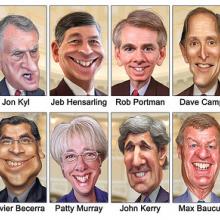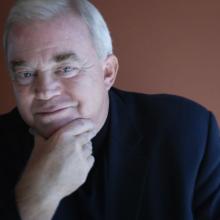Republicans
[Editor's Note: This is the first article in an election season blog series called Watch the Vote.]
In today's hyper-politicized climate, all of the hoo-hah about voter suppression can sound like a bunch of partisan pandering on both sides.
If you're just tuning now, it can easily look like Democrats are whining and crafting conspiracy theories over something that really won't matter in the end, anyway — so why waste your breath?
Or, for the even more cynical, sure, it might matter, but there's nothing we can do about it — so again, why waste our breath?
Here's why. Check this out.
Gotta say I’m a big fan of this church sign at my father-in-law’s church.
It’s time to STOP:
- Using faith, Jesus, and the Bible as a political platform;
- Cherry-picking from the Gospel based on what polls well;
- Claiming Jesus would be so myopic to identify with either of our major political parties;
...
On the heels of the Republican National Convention, where the shadow of the Religious Right still ominously looms, it was notable that the Democratic National Convention opened with a debate over the absence of the divine name. It seems that the (original) official platform of the Democratic National Party had completely left God out.
Or, should I say, they completely left "God" out.
Whether God was actually M.I.A. is a profound theological and important question beyond the scope of semantic cameos. Yet the failure to baptize their platform with the faith-filled language of Charlotte, N.C.’s evangelical culture created quite a stir, both within and beyond convention walls.
Leading the charge for the defense of the divine was none other than Paul Ryan, who made the claim that the omission of "God" was "not in keeping with our founding documents."
Apparently, Mr. Ryan was not including the obscure document known as the Constitution, which contains no reference to God.
UDATE: (Posted 9/6/12)
Criticized by Republicans and some members of their own party, Democrats voted to restore the word “God” to the Democratic national platform late Wednesday (Sept. 5). The GOP had seized upon the omission as a failure of their opponents to appreciate the divine's place in American history.
GOP vice presidential nominee Paul Ryan took to the airwaves early Wednesday to blast the change from the Democrats’ 2008 platform. “I guess I would just put the onus and the burden on them to explain why they did all this, these purges of God,” Ryan said on “Fox & Friends.”
Ryan also attacked the Democratic platform’s initial failure to affirm Jerusalem as the capital of Israel, an issue important to some American Jews and conservative Christians. After a voice vote at the party's convention in Charlotte, language about God and endorsing Jerusalem as the capital was added.
God is mentioned 12 times in the 2012 GOP platform. The 2008 Democratic platform made one reference to God: the “God-given potential” of working people. The 2004 platform had numerous references to God.
Someone asked me recently what I thought of something “as a member of the Christian Left.” My insides tightened and screeched into a ball. It was as if Freddy Krueger had run his sharpened fingernails across the black board in history class. Christian Left? Left of what? When did I sign that membership card?
Maybe it’s the title of my last book, Left, Right and Christ: Evangelical Faith in Politics, which was co-written with a Tea-Partier who is also an evangelical Christian. The book does frame me as the one on the left, but if you read my chapters you’ll see that is not my mind or my heart.
In times like these, when politicians are sweating to sway voters to their side, or frame their opponents as the polar opposite—the enemy—it is tempting to begin to define ourselves and each other through the frame of politics. We place each other in convenient little political boxes—boxes not made by scripture or the church, but by politicians and the media.
More than 20 lawmakers and Capitol Hill aides, including one nude congressman, took a booze-fueled late-night swim in Israel’s Sea of Galilee last summer, Politico reported on Monday. Which leaves at least one question: Is skinny-dipping at the biblical site sacrilegious?
Not really, Christian leaders and Holy Land experts said.
“Conservative Christians, obviously, aren't for getting naked in public or drunk anywhere,” said Russell D. Moore, dean of the School of Theology at Southern Baptist Theological Seminary in Louisville, Ky.
“The location of the Sea of Galilee, however, doesn't make the story any more offensive to Christians than it is to the general public,” he said.
Over the weekend, Salon published an excerpt from Mike Lofgren's new book, The Party Is Over:
Having observed politics up close and personal for most of my adult lifetime, I have come to the conclusion that the rise of politicized religious fundamentalism may have been the key ingredient in the transformation of the Republican Party. Politicized religion provides a substrate of beliefs that rationalizes—at least in the minds of its followers—all three of the GOP’s main tenets: wealth worship, war worship, and the permanent culture war.
Religious cranks ceased to be a minor public nuisance in this country beginning in the 1970s and grew into a major element of the Republican rank and file. Pat Robertson’s strong showing in the 1988 Iowa presidential caucus signaled the gradual merger of politics and religion in the party. Unfortunately, at the time I mostly underestimated the implications of what I was seeing. It did strike me as oddly humorous that a fundamentalist staff member in my congressional office was going to take time off to convert the heathen in Greece, a country that had been overwhelmingly Christian for almost two thousand years. I recall another point, in the early 1990s, when a different fundamentalist GOP staffer said that dinosaur fossils were a hoax. As a mere legislative mechanic toiling away in what I held to be a civil rather than ecclesiastical calling, I did not yet see that ideological impulses far different from mine were poised to capture the party of Lincoln.
Read more of the excerpt here
Both Republicans and Democrats have a religion problem and it has nothing to do with same-sex marriage, abortion or religious liberty. Rather it is budgets, deficits, and debt ceiling deadlines that are their serious stumbling blocks.
That’s right, in a city deeply divided between the political right and left there is a growing consensus from religious leaders about getting our fiscal house in order and protecting low-income people at the same time. Together, many of us are saying that there is a fundamental religious principle missing in most of our political infighting: the protection of the ones about whom our scriptures say God is so concerned.
Indeed, the phrase “a budget is a moral document” originated in the faith community, and has entered the debate. But those always in most in jeopardy during Washington’s debates and decisions are precisely the persons the Bible instructs us clearly to protect and care for — the poorest and most vulnerable. They have virtually none of the lobbyists that all the other players do in these hugely important discussions about how public resources will be allocated.
For us, this is definitely not a partisan issue, but a spiritual and biblical one that resides at the very heart of our faith. It is the singular issue which has brought together the U.S. Conference of Catholic Bishops, the National Association of Evangelicals, the Salvation Army, and the leaders of church denominations, congregations, and faith-based organizations across the nation.
Mitt Romney clinched the GOP presidential nomination on May 28, becoming the first Mormon selected by a major political party. But will his barrier-breaking faith be a boon or bane to his White House campaign?
The answer to that question could presage the next president, and two studies published in May come to contradictory conclusions.
In both studies people were given information about Romney and his Church of Jesus Christ of Latter-day Saints, then asked whether they would be more or less likely to vote for him.
There likely was little Sabbath-ing for politicians and journalists this weekend, as the debate over health policy raged across the campaign trail and in the television studios.
In a fiery comment piece in The Los Angeles Times, David Horsey reported that at CPAC, Mitt Romney pledged that he would “reverse every single Obama regulation that attacks our religious liberty and threatens innocent human life in this country.”
Speaking on Face The Nation, Senate Minority Leader Mitch McConnell stated that the contraception controversy is an issue of religious freedom.
Republican Presidential Candidate Rick Santorum laid out his position on the situation very clearly on Meet The Press.
I would never have been mistaken as a political supporter of President George W. Bush. But in his early days as president, I was invited to have conversations with him and his team about faith-based initiatives aimed at overcoming poverty, shoring up international aid and development for the most vulnerable, and supporting critical agendas such as international adoptions of marginalized children and the broken domestic foster care system.
My invitations to the Bush White House ended when I strongly and publicly opposed the Iraq War. But I continued to support the administration’s efforts to combat poverty and disease, especially Bush’s leadership in combating HIV/AIDs, malaria, and massive hunger in the poorest places in Africa.
That agenda was called “compassionate conservatism” and I was grateful for it. Back then, Republican leaders could be fiscally conservative, favor “small government,” and believe in the free market, for example, but also believe that government should and must partner with the private sector — especially non-profit and faith-based organizations — to help lift people out of poverty, both abroad in the developing world and here at home in the richest nation on the planet. Such a conviction requires two things: A genuine empathy and commitment to the poor, and a more balanced and positive view of government — neither of which were much evident in the GOP’s right-wing quarters, where the compassionate conservative agenda was opposed by party leaders such as Tom DeLay and Dick Armey.
I met people like Mike Gerson, who was then George Bush’s chief speech writer and a policy advisor, and is now a columnist for the Washington Post. I was told it was Gerson and the Bush himself who often were the ones to stand up for the compassionate conservative vision at Oval Office meetings.
Social justice is redundant.
Justice, properly understood in a biblical sense, always has social implications.
Personal salvation is redundant in the same way. Salvation, properly understood in a biblical sense, while it may have broader implications, is always personal in nature.
Why the modifiers?
Rather than the opinions of individual pundits, here’s a roundup of what the editors of some of the nation’s largest newspapers had to say this week about the failure of the “Supercommittee.”
Some blame Republicans, some blame Democrats, and most blame both.
Washington Post: “What next, now that the congressional supercommittee has failed? Depressingly, the answer is: not much, at least in the short term. Absent some intervening, cataclysmic event, the debt-reduction can has been kicked once again — this time, until after the election.”
The Independent (London): “The failure of the comically mis-named "super-committee" of Congress to come up with even the modest debt reduction package required of it has been a racing certainty for weeks in Washington. Nonetheless, Monday evening's admission of that failure – the latest proof of the dysfunctionality of America's political system – is not only shameful. It is also dangerous.”

The Supercommittee. Illustration by DonkeyHotey via Wylio (http://bit.ly/rD3M3A)
Sixty percent of white evangelicals support raising taxes on those making more than a million a year and 58 percent oppose cutting federal programs that support low-income people.
The Republicans have been taken over by an extreme ideology that their political base doesn't even support. And the power of money has corrupted our political system.
What was lost with the supercommittee was a responsible and balanced way to reduce the deficit, while protecting both the poor and the common good. Very sad and alarming for the future.
Do we want to be the kind of America that faces an historic deficit and chooses to extend $690 billion in tax cuts for the wealthiest 2 percent of our citizens while cutting $650 billion in aid to children who need special education, student aid, and additional resources for low-income schools?
Do we want to be the kind of America that protects $44 billion in subsidies for oil and gas companies while cutting $47 billion in energy grants to help poor families heat their homes in the winter?
Right now the wealthiest Americans are wealthier than they’ve ever been and people living beneath the poverty line make up a larger slice of the American pie than they have since the Great Depression.
Is that really what we want? Really?
In 'God's Country': Voting Wallets Over Religion. Why Evangelicals Forgive (Republican) Sex Scandals. The Gospel According To Herman Cain. Pope Asks African Catholics To Be ‘Apostles Of Reconciliation.’ Super Screwed. Congress May Try Blocking Cuts If Debt Panel Fails. Too Much Violence And Pepper Spray At The OWS Protests: The Videos And Pictures.
“Oh my God” was the refrain that kept going through my mind as I watched the Republican presidential candidates talk about their positions on foreign policy at their debate over the weekend.
I did not expect the surprises that I heard. At least two candidates supported torture, saying it was necessary to acquire acquire information to protect America.
Oh my God.
President’s Obama’s delay in approving the Keystone XL Pipeline is a victory for the movement to stop it, for God’s earth, for the possibility of reversing climate change, and for saving the integrity of this administration.
A “No” to pipeline approval wasn’t really politically likely, with the likelihood of attacks on Obama by the Republicans and the labor movement of sacrificing jobs during an election year — even though the pipeline offers temporary and bad jobs.
The environmental movement is part of the Democratic President’s base, but so is labor and they are both more numerous and more effectively organized to help in presidential races.
So this delay is a victory for the possible future of a clean energy economy, which would produce many more and better jobs, while making a cleaner and more sustainable economy possible.
I believe that there is a basic human dignity inherent in work. In fact, the Bible even makes special provisions to provide jobs for those who otherwise wouldn’t have one. But, when it comes to the messy legislative process, no one can claim God’s special favor on a particular bill. It is, however, appropriate to discuss what kind of moral principles legislation should try to promote.
In St. Paul’s second letter to the Thessalonians, he writes, “Those unwilling to work will not get to eat." Paul goes on to warn about those who are idle and the negative effect they can have on a community. It was essential that every person work for their own well-being and for the health of the entire community.
Hard work was praised by early Christians, but so was ensuring that every person was provided for. Acts 2 says “All the believers met together in one place and shared everything they had. They sold their property and possessions and shared the money with those in need.”
These passages could be pitted against one another. One side argues for strict capitalist principles in which the lazy starve. The other models a communal society that shares and redistributes private property. But understood properly, they actually work together.
Editor's Note: HuffPost Religion is running a series of posts by Sojourners' Director of Mobilizing Lisa Sharon Harper and D.C. Innes, her co-author on the new book, Left, Right and Christ: Evangelical Faith in Politics, about how Christians should view social issues. Their first issue is Occupy Wall Street.










